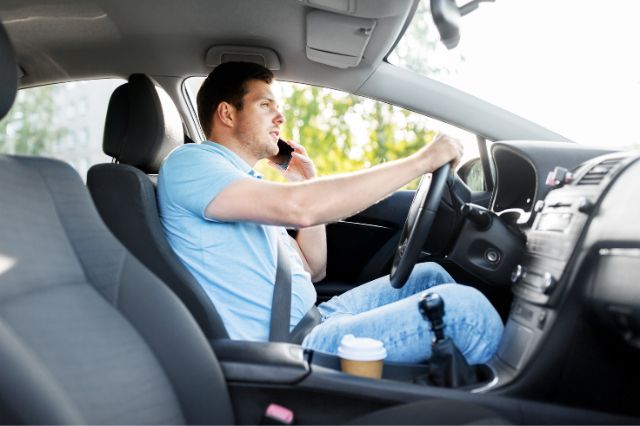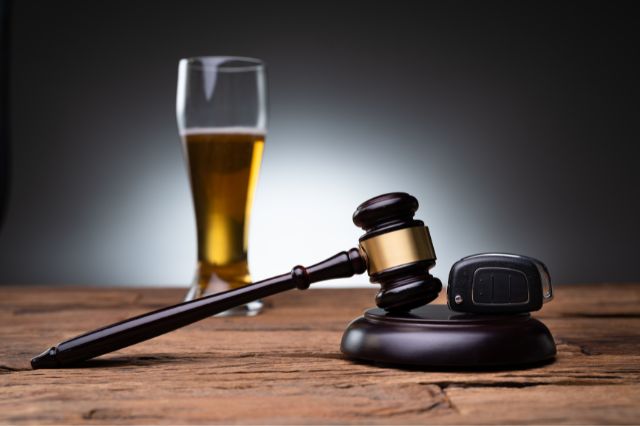Law
Distracted Driving Deaths Are Up and Smartphones Are to Blame

Distracted driving deaths are on the rise. According to the National Highway Traffic Safety Administration (NHTSA), distracted driving claimed 3,522 lives in 2021. And the problem is only getting worse. Distracted driving deaths are up from 3,142 in 2019 and 2,858 in 2018. What’s behind this troubling trend?
Smartphone distractions
One of the main drivers behind distracted driving is smartphones. According to Christoph Lauterwasser, head of the Allianz Center for Technology (AZT), “The proportion of drivers who pick up their smartphone to read or send a text increased by almost two-thirds between 2016 and 2022, from 15 to 24 percent.”
But texting isn’t the only way smartphones are being used while driving. Other forms of smartphone distraction include calling, checking social media and other notifications, and even watching videos (some drivers with a smartphone mount meant for GPS navigation use it to watch videos on the road). All of these can be extremely dangerous.
“Distractions caused by using modern technology while driving increase the risk of accidents by 50 percent,” Lauterwasser said.
The need for change
To give you a better sense of how deadly distracted driving is, consider this comparison made by National Transportation Safety Board (NTSB) vice chairman Bruce Landsberg:
“If we pull up the number of distracted driving fatalities compared to aviation, we would be losing one airliner a week, one airliner a week that’s the losses that we have due to distracted driving.”
Unfortunately, many of us are more desensitized to car accident fatalities than we are to plane crash deaths. But this doesn’t make them any less deadly. If we want to reduce preventable deaths across the board, we must work to limit distracted driving.
Challenges to reducing drivers’ smartphone use
Of course, getting drivers to look at their smartphones less can be challenging. For one, it’s difficult to prove a driver was using their phone right before an accident. This can lead to underreporting, making it hard to know how bad the problem is in the first place.
Getting drivers to refrain from smartphone use while driving is also difficult due to the addictive nature of smartphone apps. App developers purposefully design apps to keep users’ attention because that’s how they make money (via ad revenue usually). Consequently, the incentives of app developers don’t align with those of public safety.
Furthermore, public safety officials face an uphill battle in effecting reform because drivers and regulators often don’t understand the severity of the problem. Why? Because many drivers don’t want to admit they use their smartphone while driving and the issue goes underreported to regulators as a result.
Potential solutions to smartphone distractions while driving
So what’s the best way to reduce smartphone use while driving? There’s no magic bullet, but here are some potential ways forward:
- Car manufacturers can adopt technologies that enhance driver safety, such as trackers that warn drivers when they get distracted.
- App developers can promote driver safety by automatically disabling apps when the app senses the user is driving.
- Local governments and divisions of motor vehicles (DMVs) can administer more thorough driver safety training that focuses on modern smartphone distractions and their tragic consequences.
At the end of the day, it’s impossible to completely eliminate traffic accidents caused by smartphone distractions. However, significant improvements are possible.
For those who become victims of a car accident caused by distracted driving, consult a reputable car accident attorney. They can help you navigate the complex legal system of car accidents and help ensure you get the compensation you deserve.
Law
5 Essential Tips for Child Custody During Divorce


Divorce is complex, and child custody can be the most emotionally charged aspect of the whole ordeal. Unfortunately, many parents unintentionally go into divorce unprepared for how to approach child custody. As a result, they end up making costly mistakes that prevent them from getting the outcome they desire.
1. Prioritize Your Child’s Needs
First things first, always put your child’s needs first. This sounds obvious, right? But in the heat of a divorce, it’s easy to get caught up in your feelings towards your ex-partner. Courts are primarily interested in what’s best for your child, not which parent “wins.”
“Cases involving contested child custody are common in situations that involve contentious divorces or separations,” HGC Law explains. “If the parents fail to agree on a fair custody and visitation schedule, the judge will intervene and make the decision for them. In such cases, judges will always consider the child’s best interests above everything else.”
So, when you’re discussing custody, think about what will genuinely benefit your child. Does your child need to stay in the same school? Keep close to their friends and family? These are the kinds of questions the judge will consider important.
2. Show Stability in Your Life
Courts take the stability of your life into account when making custody decisions. They want to make sure that you can provide a secure environment for your child. This means having a steady job, a safe home, and a routine that supports your child’s daily needs.
If you’re moving homes or changing jobs, try to keep other parts of your life as stable as possible. Show the court that your child’s life won’t be a rollercoaster of changes. Doing this may require you to make some pretty substantial changes or sacrifices, but that’s what it takes to get custody in a contentious divorce.
3. Keep Detailed Records
You know you’re a great parent, but the court needs more than just your word. Start keeping a detailed record of your involvement in your child’s life. This could include things like attending school events, doctor’s appointments, or any regular activities you do with your child. You want it to be clear that you are a regular, consistent, and necessary part of your child’s life on a daily basis – not just when it’s convenient for you.
It’s also a good idea to keep a record of conversations and decisions you make with your ex-partner regarding your child.
This documentation can be very persuasive in court, showing that you are actively engaged in your child’s well-being. (The last thing you want is for the court to feel like you’re only engaged right now because there’s an important decision on the line. You want them to see that you have and always will be involved.)
4. Communicate Effectively
How you handle communication with your ex can greatly affect your custody case. Always aim to be clear, respectful, and cooperative. Courts favor parents who demonstrate the ability to work together for their child’s benefit.
If you communicate through texts or emails, remember that these can be shown in court. So, think carefully about how you word things. It’s easy for a short, snappy text to be taken out of context when shown as a screenshot in a courtroom. Avoid sarcasm and jokes that cross the line. Always keep it polite and focused on your child.
5. Get the Right Legal Advice
Don’t underestimate the importance of good legal representation. A lawyer who specializes in family law can guide you through the complexities of custody laws and help you prepare your case in a strategic manner that supports the outcomes you’re looking for. They can also offer strategies based on your specific circumstances and help you avoid common pitfalls.
If possible, look for a lawyer who has experience with cases similar to yours and can give you an honest assessment of what to expect. You want someone who has practiced family law in your area for many years, as they’ll have the experience and knowledge needed to help you get a more favorable outcome.
Put Your Children First
When you love your child so much, it can be really difficult to see clearly and make unbiased decisions. In a sense, you’ll do anything possible to make sure you get custody of your child. But that’s not the right approach to take.
Yes, you need to fight for your child so that you can have as much positive influence over them as possible. However, you also have to understand that there’s power in a child having a healthy relationship with both parents – even if you’re separated or divorced.
Make sure you do everything you can to put your child first, even if that means splitting custody or establishing some other arrangement that allows you both to be in the child’s life.
Law
How Long Does a DUI Stay on Your Record in Utah?


Dealing with the aftermath of a DUI (Driving Under the Influence) conviction in Utah can be a long-term concern, particularly regarding how long the conviction stays on your record.
This is a critical question for many who have faced this challenge, as it impacts various aspects of life, from job prospects to insurance rates. In Utah, DUI convictions are not taken lightly.
In fact, according to the Utah Department of Public Safety, there were 9,205 DUI arrests in Utah in 2020 alone, demonstrating the state’s commitment to road safety. Let’s delve into understanding the longevity of a DUI on your record in Utah and what it means for you.
Duration of a DUI on Your Record in Utah
In Utah, a DUI conviction is a serious offense that remains on your criminal record for a significant amount of time. Here’s what you need to know:
- Ten-Year Period: In Utah, a DUI conviction remains on your driving record for ten years. This period is crucial because a second DUI within this timeframe can result in more severe penalties, as it is considered a repeat offense.
- Criminal Record: On your criminal record, a DUI conviction can remain even longer. Utah does not have a specific expungement period for DUI convictions, meaning it could potentially stay on your criminal record indefinitely.
Impact of a DUI on Your Life
Having a DUI on your record can affect several areas of your life:
- Employment Opportunities: Employers often conduct background checks, and a DUI conviction could affect your job prospects.
- Insurance Rates: Auto insurance rates may increase significantly after a DUI conviction.
- Personal Relationships: The stigma of a DUI conviction can strain personal and professional relationships.
Steps to Mitigate the Impact
- Legal Assistance: Consulting with a lawyer can provide guidance on dealing with the DUI conviction and exploring options like expungement, if applicable.
- Behavioral Programs: Participating in DUI education or rehabilitation programs may be beneficial.
- Responsible Driving: Committing to responsible driving post-conviction can help rebuild your record.
Understanding Expungement in Utah
Expungement is the legal process of removing a conviction from your public record. In Utah, the eligibility for expunging a DUI conviction depends on several factors, including the nature of the offense and your overall criminal record.
It’s important to consult with legal experts to understand if expungement is an option for your situation.
FAQs about DUI Convictions in Utah
Can I ever get a DUI removed from my driving record in Utah?
- While a DUI stays on your driving record for ten years, you may explore expungement options for your criminal record based on specific criteria.
Does a DUI affect my driver’s license in Utah?
- Yes, a DUI conviction can lead to license suspension or revocation, depending on the severity of the offense.
What should I do immediately after a DUI arrest in Utah?
- It’s important to seek legal counsel to understand your rights and the best course of action, including potential defenses and plea options.
Conclusion
A DUI conviction in Utah can have long-lasting effects on both your driving and criminal records. Understanding the duration and impact of this conviction is crucial for those seeking to navigate their post-DUI life.
While the journey may be challenging, being informed, taking proactive steps towards rehabilitation, and seeking professional legal advice can help mitigate the long-term consequences of a DUI on your record.
Remember, responsible driving is not only about adhering to the law but also about ensuring the safety and well-being of yourself and others on the road.
Law
How Do I File a Police Report in Tampa for a Car Accident Injury?


Being involved in a car accident can be a harrowing experience, especially if it results in personal injury. In Tampa, as in the rest of Florida, it is essential to file a police report immediately following an accident.
This is not just a legal requirement; it’s a crucial step in protecting your rights, especially if you need to seek the counsel of a Tampa personal injury lawyer later.
In Florida, there were over 400,000 car accidents in 2019 alone, highlighting the importance of understanding the process of filing a police report in such situations.
Step-by-Step Guide to Filing a Police Report in Tampa
- Ensure Safety and Assess Injuries: Before anything else, ensure everyone’s safety. If there are injuries, call 911 immediately.
- Notify the Police: Florida law requires that a police report be filed for any car accident that results in injuries or significant property damage. You can call the local police or 911 to report the accident.
- Wait for the Police to Arrive: Do not leave the scene of the accident before the police arrive. Leaving the scene, especially when there are injuries, can result in severe penalties.
- Provide Accurate Information: When the police arrive, provide them with as much accurate information as possible about the accident. This includes your personal information, details of the accident, and any observations about injuries and damages.
- Get a Copy of the Police Report: The officer at the scene will fill out a police report. Ask for a copy or the report number. The report will be vital if you need to file an insurance claim or consult with a Tampa personal injury lawyer.
- Take Photos and Gather Information: If possible, take photos of the accident scene, including vehicles, road conditions, and any visible injuries. Also, exchange information with the other driver(s) involved.
- Seek Medical Attention: Even if you don’t think you’re seriously injured, it’s important to seek medical attention immediately. Some injuries are not immediately apparent.
Why Filing a Police Report is Crucial
- Legal Requirement: It’s legally required in Florida to report an accident involving injuries.
- Documentation for Claims: The report provides an official account of the accident, crucial for insurance claims or legal proceedings.
- Determining Fault: A police report is a key piece of evidence in determining fault in an accident.
Consulting with a Tampa Personal Injury Lawyer
After an accident with injuries, consulting with a Tampa personal injury lawyer can be beneficial:
- Legal Advice: A lawyer can offer advice on how to proceed with insurance claims or potential legal action.
- Representing Your Interests: A lawyer can represent you in dealings with insurance companies or in court, ensuring your interests are protected.
- Maximizing Compensation: An experienced attorney can help ensure you receive fair compensation for your injuries and other losses.
Fortunately, some of the best personal injury lawyers are in Tampa, such as Kemp Law.
FAQs about Filing a Police Report in Tampa
How long do I have to file a police report after a car accident in Tampa?
- You should report the accident to the police immediately, and no later than 10 days after the accident.
Can I file a police report if I’m not at fault?
- Yes, you should always file a police report, regardless of who is at fault.
What if the police don’t come to the accident scene?
- If the police don’t arrive, you can visit the nearest police station to file a report, or in some cases, file a report online.
Conclusion
Filing a police report after a car accident in Tampa is a critical step, especially in cases involving injuries. It serves as an official record of the incident and is crucial in any subsequent legal or insurance claims process.
Understanding this process and consulting with a Tampa personal injury lawyer when necessary can significantly impact the resolution of any issues arising from a car accident. Remember, your safety and legal rights should always be a priority in these situations.
-



 Captions3 years ago
Captions3 years ago341 Sexy Captions to Fire Up Your Instagram Pictures
-



 Captions3 years ago
Captions3 years ago311 Night Out Captions for Instagram and Your Crazy Night
-



 Captions3 years ago
Captions3 years ago245 Saree Captions for Instagram to Boost Your Selfies in Saree
-



 Captions3 years ago
Captions3 years ago256 Best Ethnic Wear Captions for Instagram on Traditional Dress
-



 Captions3 years ago
Captions3 years ago230 Blurred Picture Captions for Instagram
-



 Captions3 years ago
Captions3 years ago275 Deep Captions for Instagram to Express Your Thoughts
-



 Quotes3 years ago
Quotes3 years ago222 Nail Captions for Instagram to Showcase Your Fresh Manicure
-



 Captions3 years ago
Captions3 years ago211 Laughing Captions for Instagram | Laughter Is the Best Medicine







